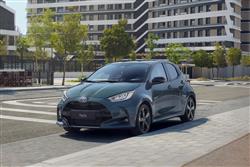Toyota Yaris - ABC Leasing
How will you view?
This is a sample, showing 30 seconds of each section.
GENERATION Y(some text hidden)
By Jonathan Crouch
Ten Second Review word count: 52
Toyota's fourth generation Yaris supermini continues to evolve with its digitalised interior and strong safety standards. As usual though, it's biggest draw is its frugal segment-leading 1.5-litre self-charging Hybrid engine, which is also available in an uprated 129bhp form. What was already a class act has just become genuinely hard to overlook.
Background word count: 193
If you were asked to name the cars vying for the title of best supermini, it would be a reasonable wager that the Toyota Yaris wouldn't be amongst your top three. If, on the other hand, you had to name a small car that would be trouble-free, cheap to run and easy to use, it would be right up there. The thing is, those criteria are exactly what many supermini buyers are looking for. They don't care if the car can't take the Esses at Donington flat without lapsing into understeer. It's an irrelevance for most but car magazines still put a huge priority on handling and award their 'best of' titles predominantly on which cars are most fun to drive at the limit. The Yaris has always been a supermini that works well in the real world and this fourth generation 'XP210'-series design, first introduced back in 2020, then updated in 2024, is no exception. In recent times, it's gained a bit more flair - and a smarter, more digitalised cabin, along with a perkier 129bhp version of the existing 1.5-litre self-charging Hybrid engine. And for 2025, there are further subtle improvements.
Driving Experience word count: 310
As before, the core engine on offer in the mainstream range is a 1.5-litre self-charging full-Hybrid petrol unit, but you can at least get it with a choice of output. The original version of this MK4 model featured this powerplant in 114hp form - and that continues with lower-order variants. Pricier Yaris models though, get this engine in a perkier 129bhp state of tune, with torque increased by 30% from 141Nm to 185Nm. That improves the 0-62mph sprint time from the base version's 9.7s to 9.2s. All Yaris models continue with the same e-CVT auto gearbox. And the Hybrid engine continues with its pleasing preference for reverting to battery power in urban driving whenever possible. As a result, the company expects that over 80% of urban journeys in this car will be able to be completed under electric power alone. As before, there are three provided driving modes. You won't be bothering much with the electric-only 'EV' option because, due to the tiny 0.76kWh size of the powertrain's lithium-ion battery, it's only good for around 4 miles. Most of the time, you'll be content to leave the car in 'Eco', despite the fact that throttle response and climate control performance will be a touch restricted. For out of town use, there's the option of selecting 'Power' if you want to buffet your fuel figures but motivate a little more petrol engine involvement to get where you're going a little faster. But going faster isn't really what driving a Yaris is all about. Unless the version in question happens to be the uber-powerful flagship hot hatch GR Yaris variant. This shopping rocket derivative gets its own 257bhp 1.6-litre three cylinder turbo engine and 6-speed 'iMT' manual gearbox mated to the compact 'AWD-i' 4x4 system that also features as an option on the SUV version of this Toyota supermini, the Yaris Cross.
Pictures (High res disabled)

.jpg)
.jpg)
.jpg)
.jpg)
.jpg)
.jpg)
.jpg)

Scoring
Category: Compact Car
| Performance | |
| Handling | |
| Comfort | |
| Space | |
| Styling | |
| Build | |
| Value | |
| Equipment | |
| Economy | 90% |
| Depreciation | 80% |
| Insurance | 90% |
| Total | 73% |